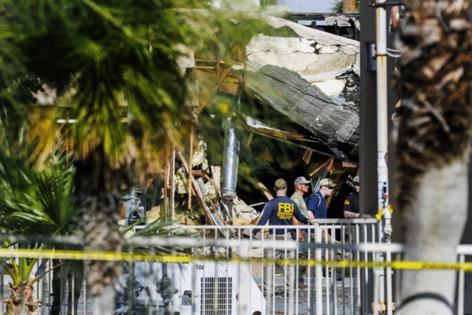Palm Springs accomplice fled to Europe after supplying ingredient for bomb, feds say
Published in News & Features
LOS ANGELES — A man from Washington state is facing terrorism charges in connection with last month’s attack on a fertility clinic in Palm Springs, federal authorities announced Wednesday.
Daniel Park, 32, has been charged with providing and attempting to provide material support to a terrorist, said Bill Essayli, the top federal prosecutor in L.A.
Park is accused of helping Guy Edward Bartkus secure 270 pounds of ammonium nitrate, an explosive precursor that can be used to construct homemade bombs.
Bartkus, 25, is suspected of detonating a bomb at American Reproductive Centers in Palm Springs on May 17, killing himself and injuring four people. The blast created a debris field of 250 yards in size, Essayli said.
Days after the bombing, authorities say, Park left the U.S. for Europe. Polish law enforcement detained him Friday, and he was arrested Tuesday night at JFK airport in New York after being deported, authorities said. When Park was confronted by Polish authorities, he attempted to harm himself, according to an FBI affidavit.
Park made his initial appearance in federal court in Brooklyn on Wednesday afternoon and was ordered detained.
Park is accused of shipping approximately 180 pounds of ammonium nitrate in January and later paying for an additional 90 pounds of the chemical to be shipped to Bartkus in the days leading up to the Palm Springs attack.
Essayli said that Park spent two weeks visiting Bartkus in Twentynine Palms in late January and early February. Three days before Park arrived at his house, according to a federal criminal complaint, Bartkus researched how to make powerful explosions using ammonium nitrate and fuel.
Bartkus and Park allegedly ran experiments together in Bartkus’ garage, from which the FBI recovered large quantities of chemical precursors and lab equipment after the bombing.
FBI Assistant Director for Los Angeles Akil Davis said that Park had a similar ideology to Bartkus and posted about these ideologies on internet forums dating back to 2016.
FBI case investigators, as well as law enforcement sources, characterize Bartkus as having “antinatalist” ideations.
In public posts online, he argued that procreation without the consent of the unborn is unethical and unjustifiable in a world struggling with environmental harm, violence and overpopulation.
“Park’s social media posts indicate that he was attempting to recruit others of like-minded ideology,” Davis said. He added that the alleged partnership between Park and Bartkus was one of “equal, mutual like-minded individuals finding themselves on the internet in these chat forums.”
“They don’t believe people should exist,” Davis said.
Search warrants conducted at Park’s residence in Washington in the wake of the bombing led agents to identify his role in the explosion, according to Davis.
Davis said six packages of ammonium nitrate were shipped from Park in Seattle to Bartkus. He said officials are awaiting the results of an analysis of the explosive precursor chemicals shipped from Park.
Park was allegedly in possession of an explosive recipe that was similar to that used in the 1995 Oklahoma City bombing. That bombing — which utilized about 5,000 pounds of ammonium nitrate — killed 168 people and is considered the deadliest act of homegrown terrorism in U.S. history.
The FBI described the Palm Springs blast — powerful enough to damage buildings several blocks away — as “probably the largest bombing scene that we’ve had in Southern California,” eclipsing the 2018 bombing of a day spa in Aliso Viejo.
Law enforcement sources previously told The Times that the bomber used such a large amount of explosives that the bomb shredded his remains.
The law enforcement sources said that authorities recovered explosive materials from Bartkus’ home and that he was skilled in assembling explosive devices. He also was a longtime rocket builder.
The online trail that authorities have been scouring to glean some insight into Bartkus’ motives includes a website dedicated to the Palm Springs bombing. It features a 30-minute recording that site data indicate was uploaded at the time of the explosion, and promises a video — never posted — of the blast. There are also YouTube videos under a web alias associated with Bartkus, and threads on Reddit and a suicide forum.
In those, Bartkus voiced despondence over the death of a “best friend,” Sophie, a woman who lived in Washington who ran multiple social media sites espousing radical feminism, veganism and intentional suicide. She died in April, allegedly shot in the head by her partner. That man told police he was acting at her request.
Davis said the antinatalist movement has been going on at least 10 years but “this is the first time we’ve seen an act of violence as a result of this movement.”
“Our biggest fear is fear of the unknown, in that these two subjects weren’t really being tracked by any law enforcement agency and the fact that they could on their own put together such a destructive device,” Davis said.
After the bombing, law enforcement recovered a cellphone that Bartkus had set up to record the bombing, according to an affidavit written by Andrew Bland, a special agent for the FBI. When authorities searched the cellphone, they found an image showing the car parked outside the fertility clinic before the bombing. The image was labeled “Promortalism.”
Bland wrote that Bartkus had posted online “an audio-recorded manifesto, a countdown to the bombing, and a video of the suicide bombing.”
In the manifesto, Bland wrote, Bartkus acknowledged that by bombing the clinic, he was “causing destruction and possibly death.”
Bartkus allegedly discussed why he chose the clinic, saying, “IVF is like kinda the epitome of pro-life ideology.”
_____
©2025 Los Angeles Times. Visit at latimes.com. Distributed by Tribune Content Agency, LLC.







Comments